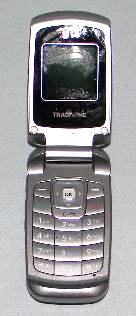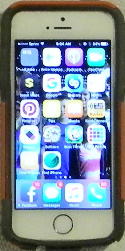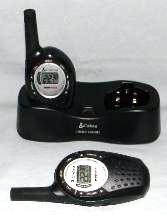
















Two-Way Communication:
Cell Phones, Satellite Phones, and Two-Way Radios
Copyright © April 2, 2011 by Robert Wayne Atkins, P.E.
Revised December 7, 2011 and May 2, 2016.
All Rights Reserved.
Introduction
During a hard times event your family may or may not need the ability to communicate with one another over extended distances. If you do need the ability to communicate with other family members then you have three basic options as follows:
- Cell Phones.
- Satellite Phones.
- Two-Way Radios.
Let's examine each of the above three options one-at-a-time.
Cell Phones
 |
 |
| Old Cell Phone | Newer Cell Phone |
At the beginning of the year 2016 cell phones are the most popular and the most widely used method of two-way communication for the following reasons:
- Size: Most modern cell phones are relatively small and they frequently measure no larger than 3.5 inches by 2 inches by 3/4 inch. Many cell phones are actually smaller than this.
- Weight: Cell phones are reasonably light at about 3 ounces. The carrying case that you can attach to your belt is about 2 ounces for a total combined weight of about 5 ounces.
- Cost: Depending on your budget you can purchase a cell phone for as low as $0.97 up to about $199. The average cell phone cost is about $40. In most cases the purchase price of the phone requires you to sign a contract for a specific period of time with the cell phone provider. However, there are exceptions, such as the Tracfone.
- Range: When a cell phone is within the operating range of a local cell phone tower, a cell phone may be used to call another phone almost anywhere in the world, if that phone is connected to a hard wired network or it is within range of another cell phone tower.
- Coverage: Coverage is almost world wide with the exception of areas that are not inhabited, or in areas with unstable governments.
- Portable: You can easily carry a cell phone with you almost anywhere you go, with certain exceptions, and you can send or receive calls anytime during the day, and on any day of the week.
- Charging: The cell phone battery may be recharged using ordinary house current or your automobile battery. Being able to recharge your cell phone battery using your automobile battery is extremely nice because you do not have to worry about a dead cell phone battery in an emergency situation if your vehicle should become disabled and you need emergency roadside assistance (assuming your car battery still works).
- Features: In addition to providing two-way communication, most modern cell phones have a multitude of other features, such as text messaging, internet surfing, emailing, and instant weather.
- Ease of Use: Cell phones are extremely easy to use for two-way communication. However, some of the other features on a cell phone may require a diligent review of the instruction manual that comes with the cell phone.
- License: A person does not need a license to purchase and operate a cell phone.
The major disadvantage of a cell phone is that it may not work during a serious hard times disaster event. There are two reasons for this:
- Many of the cell phone towers may be damaged and out of operation.
- The majority of the people in the disaster area will be trying to use their cell phones at exactly the same time to contact their other family members and this will overload the cell phone network.
Therefore, if the major reason you are considering a cell phone is for two-way communication during a serious hard times event then the chances are pretty good that your cell phone will not work at the time you need it the most.
One of the important advantages of a cell phone is that you can use it almost anywhere. This is especially helpful if your vehicle breaks down while you are driving. If you have a cell phone with you inside your vehicle then you can call for assistance and avoid a very long walk, and you can avoid the possibility of exposing yourself to harm from criminals who might try to take advantage of you in this type of situation.
At the beginning of the year 2016 the most affordable cell phone is the Tracfone. The cost of the cell phone will typically be somewhere between $10 to $30. It comes with an AC charging adapter. I recommend you purchase the separate DC charging adapter for apprximately $10 to $15. You can purchase air time minutes for an entire year, along with triple minutes for the life of your phone. At the end of the year any unused minutes will not expire if you extend your contract for another year. The total cost of one year of service which includes 1200 minutes of air time is about $100, plus the cost of the cell phone. There are no unexpected fees or charges with the Tracfone. If you unexpectedly need more minutes you can easily purchase them using your Tracfone and a credit card, or you can buy extra minutes at any place that sells Tracfones, such as Dollar General or Walmart.
Satellite Phones
A satellite phone has all the advantages of a cell phone with the following three exceptions:
- Phone Cost: The purchase price of a satellite phone is between $500 to $1500.
- Monthly Fee: The minimum monthly fee for satellite phone service is about $20 per month for coverage in the United States.
- Coverage: A satellite phone sends its signal up into the air to satellites above the earth. The phone call is then relayed to another satellite phone or to a cell phone or to a hard wired phone anywhere on the earth that currently has phone coverage.
The two major advantages of a satellite phone are as follows:
- It can be used in remote wilderness areas where there are no cell phone towers because the satellite phone sends its signal straight up.
- It will normally still be operational during a serious hard times disaster event because a satellite phone is not dependent on the local cell phone towers or the hard wired telephone network.
Therefore if your primary concern is reliable emergency two-way communication during a serious hard times disaster event then a satellite phone is the superior choice.
However, if you use a satellite phone during a hard times disaster event and any law enforcement officer or emergency relief worker sees that you have an operating phone then they will immediately confiscate your phone for their own use. When they take your phone they will guarantee you that you will get your phone back and that their organization will pay any and all the extra fees and charges while your phone is in their possession. However, there is a very good chance you will never see your expensive satellite phone again and you will have to pay thousands of dollars in additional air time that you did not authorize but which you are legally responsible to pay under the terms of your contract.
Two-Way Radios
There are a wide assortment of two-way radios but only two will be examined at this time:

- Two-Way Hand Held Radios: These radios may be purchased and used by anyone without a license. Their most significant disadvantage is their limited range. Although they may work under optimal conditions at ranges of five or ten miles, most of them have a normal operating range of between one-half mile to one mile. The radio must be turned on to send or receive and this consumes battery power. However, transmitting consumes significantly more power than listening. Many of these radios have multiple channels (such as 22) and each channel may have multiple privacy codes (such as 38) so the total number of privacy combinations may be 836. However, these radios transmit at established frequencies and they are not secure. Anyone with an automatic channel scanner can isolate your frequency and listen in on your conversation. That person can even interrupt your conversation by speaking at the same time you are speaking. Depending on your specific situation these two-way radios may or may not be of some use to your family in certain circumstances. That is a decision you will need to make on your own.
- Amateur Radios (Ham Radios): To operate one of these radios an individual must pass a test and be granted an operating license. The individual must then invest several hundred dollars (or more) in radio equipment and antennas. Finally, the individual can only communicate with other amateur radio operators and the other operator must be listening to the same exact frequency at the exact time of the transmission. Although an amateur radio may be used at any time of the day and on any day of the week, its transmission effectiveness is impacted by a variety of geographical and atmospheric conditions that will either improve or interfere with its performance. In other words, during severe weather conditions the performance of an amateur radio declines significantly.
Conclusion
During normal times a cell phone is typically the best choice for the vast majority of people.
However, during a hard times event in which you become a participant, either a satellite phone or an amateur radio would probably be a much better choice.
The disadvantage of a satellite phone is that it requires a functioning satellite network.
The advantage of an amateur radio is that each amateur radio is independent of all the other amateur radios in the world. Each amateur radio can function independently from the rest of the amateur radio network. However, during a serious hard times event you may need to use one of the many world-band frequencies and not a short-range local frequency that depends on repeaters. In addition, the exact location of an amateur radio may easily be determined if it is transmitting so these radios are relatively easy to locate. However, if an amateur radio is only used for listening and it is not used for transmitting, then it cannot be located using signal tracking technology.
Additional Comments about Cell Phones
The hard times are continuing to get worse for many of us. Therefore most of us are constantly looking for a way to reduce our monthly living expenses without significantly downgrading our standard of living.
Most of us still need to be able to communicate with our current employer, or with potential future employers where we have applied for a job, or with family and friends to let them know how we are doing. Therefore some type of phone is still a necessity for most of us.
The advantages of a cell phone during hard times are:
- The cell phone is always with you.
- If you are forced to relocate then your phone and your phone number go with you to your new location.
- In the event of an emergency you have instant access to a phone.
- If you are trying to find work and you have completed applications with several different companies then those companies can call you on your cell phone.
- At less than 6 cents per airtime minute (Tracphone) you can still afford to talk to a prospective employer on the phone.
- At about 2 cents per minute (Tracphone) you can still text message your family and friends as the need arises.
Tracfone does not require any type of contract. Your only costs are the price of the phone, the length of service (such as one-year), and the cost of airtime minutes. You may buy additional airtime minutes whenever you need them. There are no surprises because you do not get a phone bill every month. You can easily add months, or a year, to your account as needed. And you can easily add minutes when you need them. And if you don't use all your minutes then they do not expire but they will remain active as long as you have an active cell phone account. The expiration date of your current cell phone account, and the number of minutes you have available, are always displayed on your cell phone each time you turn it on.
Respectfully,
Grandpappy.
Grandpappy's e-mail address is: RobertWayneAtkins@hotmail.com








































